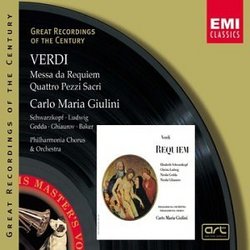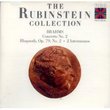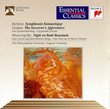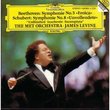| All Artists: Giuseppe Verdi, Carlo Maria Giulini, Christa Ludwig, Philharmonia Orchestra of London, Elisabeth Schwarzkopf, Janet Baker, Nicolai Gedda Title: Verdi: Messa da Requiem /Quattro Pezzi Sacri Members Wishing: 0 Total Copies: 0 Label: EMI Classics Original Release Date: 1/1/1963 Re-Release Date: 4/10/2001 Album Type: Original recording remastered Genre: Classical Styles: Opera & Classical Vocal, Historical Periods, Early Music, Modern, 20th, & 21st Century, Symphonies Number of Discs: 2 SwapaCD Credits: 2 UPCs: 724356756328, 724356756359 |
Search - Giuseppe Verdi, Carlo Maria Giulini, Christa Ludwig :: Verdi: Messa da Requiem /Quattro Pezzi Sacri
 | Giuseppe Verdi, Carlo Maria Giulini, Christa Ludwig Verdi: Messa da Requiem /Quattro Pezzi Sacri Genre: Classical
|
Larger Image |
CD DetailsSimilarly Requested CDs
|
CD ReviewsA definitive performance; greatly improved sound! pm444 | Okemos, MI USA | 05/15/2001 (5 out of 5 stars) "The Giulini recording of Verdi's "Requiem" has long been a favorite of many listeners, both for the conducting and the quality of the soloists, most of whom were at the peak of their careers. EMI re-issued it on CD back in 1986, but the sound was always a problem, especially in the loud choral passages, where it distorted and broke up. This new remastering is a huge improvement over the 1986 version. EMI has made excellent use of new noise-reduction technology to give new clarity to this brilliant peformance, and to almost eliminate the distortion in the loudest passages. There is still some audible break-up in a few places (technology cannot totally overcome limitations of the master tapes), but it's a lot less intrusive than on the previous version. Anyone who loved this performance even with the sound problems will find that they can now listen to it without cringing at the loud parts. Anyone who has not yet heard this recording is in for a real treat! As with other issues in its "Great Recordings of the Century" series, EMI has provided very good packaging and notes." One of the best pm444 | 02/08/2002 (5 out of 5 stars) "A great Italian conductor (Giulini), a great song cast at thier peak (Schwarzkopf, Ludwig, Gedda and Ghiaurov), great chorus and quite good sound make this one of the best Verdi requiem recorded.This is not crystal clear sound that you find at Gardiners DDD version recorded by Philips in 1995 but for a version origin date 63 and 64, remastred at Abbey Road studio, it has very good sound and Giulini has choosen a couple of the best opera singers from that time for this stunning Verdi Requiem/Quattro Pezzi Sacri.Buy Guilini and Gardiner and compare. Both versions is excellent and they differ in sounds and orchestra. To take this one as no 1 is not a bad idea if you cant afford Gardiners too. This is a mid price record and it is well used money. You could pay full price and not get a fantastic performance like this in other cases... (newest is not always best). This remastered version is from 2001 and I think remaster process take place in 1997 so dont worry about sound (even if gardiners at Philips has a better sound). Sound is smoothe and Gedda was a fantastic tenor. This Giulini/EMI version is highly recommended." TREMENDAE MAJESTATIS DAVID BRYSON | Glossop Derbyshire England | 09/12/2005 (5 out of 5 stars) "This set can be recommended from two points of view. Firstly it contains all Verdi's mature choral works; and in the second place this account of the Requiem is perhaps the greatest ever recorded. After the Requiem came Otello and Faslstaff, and last of all he gave us the Four Sacred Pieces. Two of these are for unaccompanied voices, one in particular featuring an allegedly special scale, which I doubt we would be aware of if we had not been told. They are only described as `academic' or as `exercises' because they are by Verdi, who put up a smokescreen of self-ascribed simplicity all his career. In fact he had always studied and loved the mediaeval Italian polyphonists and these two compositions can easily rank with similar works by Brahms in my opinion. In Brahms or Bach we take the academic element for granted as all part of the style, which is entirely in the German tradition. Verdi was almost as exclusively based in his own country's music - all he took from German music was features of style that Italy had given to Germany in the first place, and we hear him at that with the explicit reference to Schubert's A minor quartet at the start of the Requiem. However there is more unaccompanied vocal work in his Requiem than in anything in the German choral/orchestral repertory, and that should not surprise us.
There is a slightly average liner-note that assures us solemnly that `it is not necessary to be a practising Catholic...to conduct Verdi's sacred music'. I guess that lets Toscanini off the hook, and I don't think Giulini's performance of the Te Deum is quite the equal of his. However in the Requiem Giulini seems to me to surpass everyone I've ever heard, Toscanini among them. There is not an Italian among the soloists, and when I listen to, say, Schwarzkopf's exquisite falling phrase at `Salva me' I still experience a slight longing to hear it dragged down in a lachrymose Italian tone, but they have too much integrity for cheap compromises, they are simply terrific in their own right, and Giulini supplies the Italian element. His sense for this great score seems to me perfect. He understands Verdi's alternations of fierce and almost brutal power with relaxed lyricism. Verdi's energy is physical, not nervous like Beethoven's. He is always powerful but rarely or never tense. The soloists do not miss a trick either. The monstrous demands of first climax of the Kyrie, with the soprano required to dominate her colleagues, choir and orchestra flat-out, are achieved grandly, and at the other extreme they are sublime in all their solos, and the great phrase at Tantus labor non sit cassus is wringing with emotion but perfectly under control. The Philharmonia chorus of the day (1963) was probably the best in the world, and the orchestra probably likewise. At full tilt in the Dies irae, with the spotlight on the brass at Tuba mirum, the cellos climbing above the treble clef at the start of the Offertorium, the celestial bassoon obbligato in the Quid sum miser - everything is just right and more. For me Verdi's Requiem is the greatest choral masterpiece since Handel himself, and his Te Deum for me surpasses Berlioz and Bruckner and is indeed the finest setting since Handel's own mighty production celebrating the ludicrous victory at Dettingen. Giulini is excellent by any standard, but I still miss the incomparable surge and thrust that Toscanini brought to it. However there is a startling bonus here in the form of a solo of a few bars right at the end from Janet Baker no less. I wonder what that cost -- the spot is normally given to a member of the chorus. The Stabat Mater is powerful and affecting, and the chorus perform superbly on their own in the other two works. The recording is not awfully `forward' and it doesn't always treat Ghiaurov very well, but otherwise I must say my Sony equipment coped perfectly adequately, and it was a relief to be rid of the surface swish and pre-echo at points on my LP set. I checked the text and translation of the Dies irae and the Stabat Mater, and the standard was a lot better than I have been encountering lately on other productions. There are two minor misprints in the Stabat Mater (`corni' for `cordi' and `pagis' for `plagis'). `Fac me crucem inebriari' is not Latin, and we can be pretty sure the text ought to be `...cruce...', with this line and the next meaning literally `Make me drunk with the cross and with the blood of the Son'. Otherwise my only comment is that the stanza `To stand with thee...' should be governed by the verb `I desire'. I lack the discernment of the liner-note author who finds the stanzas of varying literary merit. Giulini did at least one later version, but I never yet heard one to equal this, from him or from anyone. I have no real difficulty with the recording, and I greatly hope you do not either." |

 Track Listings (15) - Disc #1
Track Listings (15) - Disc #1








